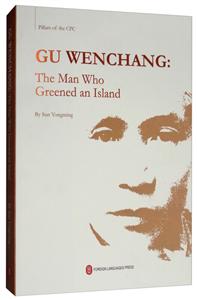-
>
論中國
-
>
中共中央在西柏坡
-
>
同盟的真相:美國如何秘密統(tǒng)治日本
-
>
中國歷代政治得失
-
>
中國共產(chǎn)黨的一百年
-
>
習(xí)近平談治國理政 第四卷
-
>
在慶祝中國共產(chǎn)主義青年團成立100周年大會上的講話
Gu wenchang: the man who greened an island(中國共產(chǎn)黨人 谷文昌) 版權(quán)信息
- ISBN:9787119120492
- 條形碼:9787119120492 ; 978-7-119-12049-2
- 裝幀:一般膠版紙
- 冊數(shù):暫無
- 重量:暫無
- 所屬分類:>>
Gu wenchang: the man who greened an island(中國共產(chǎn)黨人 谷文昌) 內(nèi)容簡介
《中國共產(chǎn)黨人 谷文昌(英文)》以報告文學(xué)的形式,敘述了中國共產(chǎn)黨人的楷模——谷文昌的生平事跡。谷文昌是習(xí)近平總書記6次點贊的一名共產(chǎn)黨員,一位縣委書記。谷文昌在福建省東山縣,擔(dān)任縣委書記十年,改變了東山的面貌。他踐行“不把人民拯救出苦難,共產(chǎn)黨拿來做什么”的誓言,率領(lǐng)福建省東山縣人民苦戰(zhàn)十年,筑綠色長城、治風(fēng)沙,為民敢扛一片天,對黨和人民高度負責(zé)的精神,贏得了民心,老百姓尊他為“谷公”,“先祭谷公,后祭祖宗”,也成為當(dāng)?shù)囟嗄甑牧?xí)俗。谷文昌是踐行社會主義核心價值觀的先驅(qū)者,是踐行中國共產(chǎn)黨群眾路線的干部典范。谷文昌的事跡展現(xiàn)了中國共產(chǎn)黨人崇高的人格魅力,詮釋了中國共產(chǎn)黨好干部的標準。
Gu wenchang: the man who greened an island(中國共產(chǎn)黨人 谷文昌) 目錄
Chapter 1 Before the 1949 Liberation
A Peasant’S Pedigree
Peasants and Leading the Peasants
Fire Proves Gold
Chapter 2 Dongshan Island at Dawn
The Darkest Hour before Dawn
Marching into Dongshan Island
HeaW Responsibilities
A Twisting and Arduous Path
Chapter 3 Those Who Win the People’S Hearts Win the Wlorid
The Sea of Tears
Always alongside the People
Establishing Cooperatives
Creating a Chinese Political Term
Chapter 4 Defending the People’s Government
Setting Sail on a Voyage
Dongshan Island before the Storm
Defending Dongshan Island
Chapter 5 Facing Poverty
Dramatic Changes in Dongshan
Tiding over Difficulties
Helping Fix a Family
The First Dream
Chapter 6 Building Socialism in Dongshan
Constructing the Homeland
Combating Nature
Chapter 7 A Communist’S Confidence
Youth and Love
Revolution and Development
Moving forward in Perplexity
Chapter 8 In Face of
Seeking Truth from Facts
Seeking the Way Out
Chapter 9 Dongshan County in
A Changing Road
Keeping Faith
Oath to Ideal
A Dream Broken by Wind
Chapter 10 Gu Wenchang in
Selfless,Thus Fearless
Wise Decisions Made
Never Yield to Difficulties
The Turnaround
Chapter 11 Gu Wenchang’S Last Years
Sticking Together in Tough Times
Not a Single Tree to be Felled
Straightening up the Back
Gu wenchang: the man who greened an island(中國共產(chǎn)黨人 谷文昌) 節(jié)選
《中國共產(chǎn)黨人 谷文昌(英文)》: Two terms - revolution and liberation - were on the lips of many in China during the Chinese People's War of Resistance against }apanese Aggression (1937- 1945), but taking practical action to acLueve revolution and liberation was no simple matter - It could cost you your life. So what d/d revolution and liberationmean to a peasant? Gu Wenchang, a symbol of a generation, yearned to shake off poverty and slavery, live a worthy life, and expel the Japanese aggressors. He upderstood these revolutionary principles, and he bravely spread these ideas to the peasants in and around Nanwan Hamlet. He did not join any political party or progressive organization at that time, but through his own experience and his own feelings, he became politically awakened. He described real events he had experienced to his peasant friends in and around Nanwan Hamlet. “I saw the Eighth Route Army bring water and rice to us peasants and help us clean the yard. Some of them even provided us with medical treatment.” They asked, “Is it really that good?” “I have seen it with my own eyes.” Gu Wenchang did not get carried away “Just think about it. Wherever the Eighth Route Army arrives, the villains run away, or they will get caught……” They said, “Of course the evil are afraid of the good ... But who will lead the revolution and the fight against the Japanese in Nanwan Hamlet?” “Someone will,” answered Gu. “It is just a matter of time. When that time comes, we must unite and devote ourselves to the revolution…… The mindset of the Chinese peasants in the rrud-20th century, when they began to accept the idea of revolutionary theory, was simple enough - Revolution meant survival. It was hoped that the revolution would ensure that their basic needs were met. The targets of the revolution were despotic landlords, localty-rants, and evil gentry who had long oppressed the peasants. Few of the peasants knew Karl Marx and Vladimir Lenin, and even the name of Mao Zedong was un-familiar to many until the revolution began to achieve penetration and success. In September 1934, Gu Wenchang was 19 years old. As winter approached,in order to protect his foot-bound wife and three sons from starvation and cold,his father Gu Jihuo once again climbed up the cliff, carrying a wooden frame on his back, a machete on his waist, and a long rope on his shoulders. He had al-ready experienced countless such days, and he could not have expected this to be his last. But Gu Jihuo fell from a substantial height. Gu Xiuzhen, his eldest son,watched helplessly as his father fellin front of his eyes. Gu Jihuo lay semi-conscious across his son's shoulders, listening to his son's heavy footsteps. With bewildered eyes still open, he remained consaous until he saw the outline of his home. ……
Gu wenchang: the man who greened an island(中國共產(chǎn)黨人 谷文昌) 作者簡介
孫永明,Sun Yongming was born in Fuzhou City, Fujian Province in 1955. He is a member of Fujian Writers'Association and China TV Artists Association(CTAA).He has published several works of non-fiction, in-cluding In the Shade of the Tionshon Mountoins:External Officials Supporting Xinjiong(1998-2010).The documentaries he has written include The Road Builders of Fujian(1991-1992) and The Bond be-tween Fujion and Tibet: Fujian Officials Working in Tibet(1995). His writings have won the Best Works Award organized by the Publicity Department of the CPC Central Committee, Best Documentaries Award of Fujian Province, and Best Literary Works of Fujian Province.
- >
羅庸西南聯(lián)大授課錄
- >
龍榆生:詞曲概論/大家小書
- >
煙與鏡
- >
詩經(jīng)-先民的歌唱
- >
李白與唐代文化
- >
新文學(xué)天穹兩巨星--魯迅與胡適/紅燭學(xué)術(shù)叢書(紅燭學(xué)術(shù)叢書)
- >
名家?guī)阕x魯迅:朝花夕拾
- >
羅曼·羅蘭讀書隨筆-精裝

















